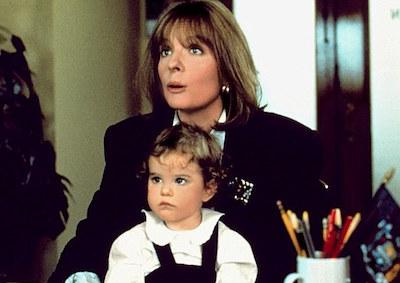 The death of Diane Keaton over the weekend had a lot of us poking around streaming services, hunting for something to remind us of what made the Oscar winner an icon of her era.
The death of Diane Keaton over the weekend had a lot of us poking around streaming services, hunting for something to remind us of what made the Oscar winner an icon of her era.



:max_bytes(150000):strip_icc():focal(749x0:751x2)/diane-keaton-baby-boom-101125-0ce5c7b4e7f745188f9d550d0f1af34e.jpg)
I found myself envious of veteran character actor Britt Leach. He landed the plum role of the lone plumber in the “Newhart” era Vermont village of Hadleyville, where Keaton’s “Tiger Lady” New York management consultant J.C. Wiatt moves to raise a child away from the rat race she reluctantly dropped out of. He even gets to sing at the local harvest dance.
Keaton and screenwriters Nancy Meyer and Charles Shyer (he directed) subject Leach — often cast as yokels — to an epic rant about the perils and insane costs of buying an older farm house — “Ya WELL’s dried up!” — and the infuriating inconveniences of moving to the sticks with the hicks. It’s shot in basically one long, snowbound take, and it’s a doozy.
Oh, to have been on the receiving end of that. Lucky man.
And to anybody who’s ever “escaped to the country,” this scene still stings, especially the dreaded “Ya WELL’s dried up!”
“Baby Boom” would began Keaton’s with a long association with Meyers and Shyer — two “Father of the Brides” and “Something’s Gotta Give” — and set her up for her “woman of a certain age” career, decades of comedies that would include “The Family Stone” and “First Wives Club.”
“Boom” presents J.C. as a woman with “it all,” or everything she thinks she’s ever wanted — Harvard degree, top job and partner prospect at a management consultant firm run by Fritz (Sam Wannamaker), a workaholic who wears out staff (“SNL” vet Mary Gross) and her protege “Ken” doll, James Spader.
She works 70 hours a week and shares that work-work-work ethos with partner and fellow over-achiever Steven (Harold Ramis), with even their posh apartment sex life seems on the clock.
And then a “really BAD connection” late night phone call from overseas upends it all. Partnership in the firm? That big deal landing new client The Food Chain by impressing their CEO (Pat Hingle)? Some distant English cousin died on vacation and has left her his toddler.
Exasperated J.C. has to park the fussy kid with secretaries and coat check girls, weigh her in supermarket scales so that she gets the right Huggies, dismiss her to her sexist boss and agree to give her up for adoption to keep her no-time-for-babies live-in beau.
“I can’t HAVE a baby, because I have a 12:30 lunch meeting!”
J.C.’s story arc has her coping with the male-dominated office politics of her workplace that suddenly limits her career and the insensitivity of Mr. Wrong at home by chucking it all and moving to a Vermont apple farm.
Once there, she meets just enough of the locals and copes with just enough of the culture shock — and home repairs — to faint from her exasperation. That sets up her “meet cute” with the lanky, hunky local doc (Sam Shepard). She doesn’t find out he’s actually the local veterinarian until after she’s spilled her overwhelmed and “no sex” guts to him.
But the wish fulfillment fantasy doesn’t begin and end with having a baby accidentally thrust upon you, with none of the messy business of coupling, carrying and giving birth. There’s got to be a way for a “Working Girl” like J.C. to identify a niche market and make a killing and “have it all,” even in rural Vermont.
“Baby Boom” came out in the middle of the baby boom/baby-busters have-to-figure-out-parenting cycle of films and TV series that followed “Mr. Mom, “Three Men and a Baby” and “Parenthood” and led to TV’s “thirtysomething.”
I was just starting my career in this era, and I had an editor whom I worked with who never tired of writing columns about all these movie and media parents acting as if their generation “discovered” parenting’s woes and demanding that they “stop the whining.” They never did.
The worst film of this cycle was John Hughes’ militantly retrograde “Curly Sue,” an against the current condemnation of working womanhood so backward it’s a wonder Joe Rogan wasn’t in it. I first realized Siskel & Ebert had gotten “old” the moment they raved that toxic dump up the way they raved up all of Hughes’ Chicago cinema.
“Baby Boom” got mixed reviews on its release, and that’s understandable. The “wish fulfilment” stuff is a bit hard to take. And the short production schedule meant that little Kristina and Michelle Kennedy didn’t grow up on camera, but stayed the same wide-eyed-and-gurgling age for the film’s year-long story.
But it ages well. Every year or three, it’s rediscovered as fodder for “what it says to working women” as America’s workforce achieves numerical gender parity, if not compensation parity.
And it still plays, making one marvel at the career third act it led to for the eternally hip, thin and cool Keaton. “Funny is money,” she told me once in an interview, and that was her secret and her creed. Whatever this film and many of those that followed it lacked, parking Keaton in it guaranteed laughs.
She makes J.C. Wiatt brusque, businesslike and intimidating, but also approachably human. Sure, it’s a cliche that she softens up in the presence of a toddler. But she’s so amusingly unsuited to “mothering” that the main thing “Baby Boom” lacks is a post credits title.
“No toddlers were harmed in the making of this comedy.”



